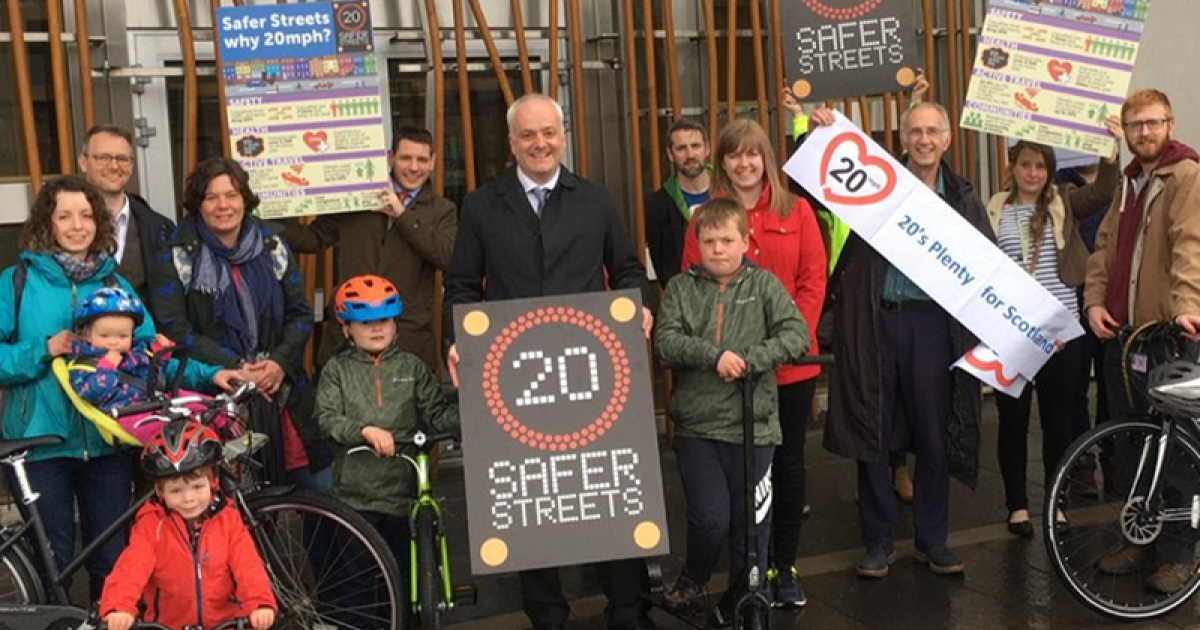Six reasons why these MSPs got it wrong on Safer Streets

The Scottish Parliament's Rural Economy and Connectivity Committee released today it’s Stage 1 Report on my Safer Streets Bill to make 20mph the default speed limit on streets where we live, work and play.
The report concluded that while 20mph brings a number of health, liveability, placemaking and active travel benefits, and has no negative impact on air pollution or journey times that they do not recommend the general principles of the bill.
A majority of the committee comprising Tory, LibDem and SNP MSPs concluded that a ‘one size fits all approach’ of delivering 20mph limits across Scotland should not be adopted.
The committee was divided however, with Labour’s Colin Smyth, Green John Finnie and the SNP's John Mason backing my bill on the basis that the current approach of piecemeal 20 zones has led to ‘inconsistency’ across the country.
Here are 6 reasons why these three MSPs got it right from the evidence in the committee’s own report.
- It encourages active travel. 20mph areas have been shown to increase rates of walking and cycling. Encouraging active travel is essential to meet our climate goals and helps people lose weight and stay healthy – reducing the burden on the NHS. REC said: “Based on the evidence heard and the available research to date, the Committee notes that an introduction of 20mph sign-only zones can contribute to small but important increases in active travel modes such as walking and cycling due to an increased perception of safety”
- It reduces air pollution. The evidence is clear – 20mph limits have at worst no negative effect on air quality and in fact are much more likely to make our air cleaner due to a reduction in particulates caused by smoother driving. REC said: “The committee notes the argument that reducing the speed limit may improve air quality”
- They’re safer! 20mph areas save lives. Even a reduction in average speeds of 1mph results in a 6% decrease in accidents. Bristol council estimate that their 20mph roll out saved 4 lives a year. REC said: “The committee supports the policy intention of a wider deployment of 20mph zones in Scotland, especially where pedestrians are present, and acknowledges the road safety benefits this would deliver”
- They make our roads more pleasant. People’s perception of safety is really important for mental and physical health. More pleasant liveable spaces encourage active travel and improves our sense of community. REC said: “the committee agrees that 20mph zones can contribute to social inclusion, the quality of life and the ‘liveability’ of neighbourhoods and streets.”
- It doesn’t affect journey times! There’s been concern from motorists that the bill would increase journey times and fuel costs. Actually, 20mph doesn’t result in increased journey times or fuel consumption. The smooth flow of traffic negates the slower speeds and prevents bottle necking. REC said: “[the committee] acknowledges that available research suggests that 20mph limits do not generally have a significant impact on journey times or traffic congestion.”
- It’s not actually expensive. The committee report is very concerned with the costs of introducing 20mph. There are 46 paragraphs on costs across ten pages with only one paragraph discussing the savings of 20mph limits. The conclusion ignores evidence from experts such as Dr Ruth Jepson who stated that “up-front costs were high, but the Bill represents good value given the gains as a result of that investment over 20 or 30 years in terms of a reduction in mortality and the number of non-fatal accidents.” Despite this the committee concluded the cost section saying: “it is clear that the Bill’s proposals to make roads safer would have a variety of financial impacts.”
So, despite the numerous positive benefits listed within the REC report itself a majority of the committee decide that ultimately, it’s too expensive.
If you agree with us that it’s worth spending money to save lives write to them and ask them to support the #saferstreets bill!
